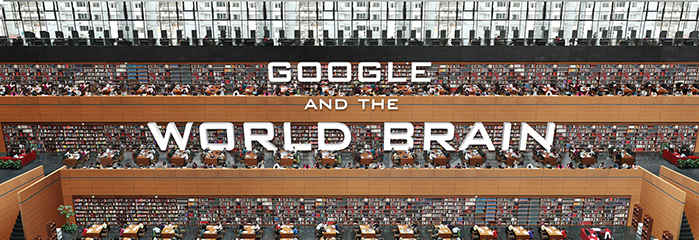By: Michael Diedrick on Sep 23, 2013

Byte is co-presenting a film at the Milwaukee Film Festival this year, Google and the World Brain -- official site with trailer.
Google started as a company in 1998 with a mission "to organize the world's information and make it universally accessible and useful." They, of course, monetize it with those sponsored ads you see in their search results. Back in aught two, Google also started scanning books into a large database, without asking anyone for permission, much like they’ve scanned the internet for their search results, and the streets for their Street View. You’ve helped them scan the books, by the way, with every “recaptcha” you’ve filled out to prove you’re human, one of the two words is a human-powered recognition of those scanned books. You’ve also likely fell upon the google books section in searches, and maybe learned something. They don’t usually link anywhere, so they’re better for abstract ideas -- lateral learning, we might call it.
So you’re thinking -- wait -- they just scan everything, steal the books you’ve slaved over as an author? Well, yes. But there’s a key component: if you’re a publisher or author, you can “opt out” of their results, or show only the first chapter, say. It works the same way on the internet -- if you have a site you don’t want indexed, you can opt out by ‘disallowing’ their robots. But that’s not the default position -- you can only opt out after you know it exists. Which if that were reversed, you’d still be climbing Alta Vista and asking Jeeves why web searches pretty much suck.
In a film that asks if Google’s going too far, and if they’re essentially following an adapted script of an HG Wells concept (and collection of stories), World Brain. We haven’t seen the film yet -- we’ll be watching along with you at the Milwaukee Film Festival -- yet Google and the World Brain seems to be positing that there’s evil lurking below Google’s “don’t be evil” unofficial motto. The trailer ends with “google could basically hold the whole world hostage,” pushing the idea that their seeming monopoly could limit access to the world’s knowledge.
Hey, we’re cyberpunk fans as much as anyone, and the idea of Google becoming its own state and world dominator because it erases references to real state-run governments is great fun, but seems like the Wikimedia Foundation would have sizable power in the world knowledge war, and so would any good public library system, and so would you, regular human, as you check out books that are meaningful and scan them into your own world-dominating database. Want into this war? Here’s a nice DIY weapon.
Based on the previous, this documentary might just be good drinking game fodder -- a sip for any ‘series-of-tubes’ error, a gulp for every time Google doesn’t want to talk to people with cameras while there’s an active lawsuit, a whole glass every time Google is shown as a hive mind. I hope there’s a lot more to it.
While the documentary is likely to hound Google with the fact that they’re a corporation and can only care about profits, it’s been fascinating to watch Google create a corporation where they themselves maintain voting control (by different classes of stock) and are far less persuaded by the corporate system of money-only shareholders.
One idea I hope to see explored is how 2002 Google, before the googleplex and before going public, started a project they didn’t know or seemingly care how it would be monetized, nor how it would be seen by the public or copyright holders. Was it academic curiosity or a hidden algorithm they were searching for? Or was it just because they thought it should be done? And how does an ambitious idea work when you concurrently become the fifth largest company in the world by market share?
There are other great questions the movie could bring up. Questions about how much rights a copyright holder should have, about the disruption of big business publishers, and about the World Brain, some sort of artificial intelligence that’s only possible with fuel from books. Are books sacred somehow, their dead trees give them life? Or is there a process that makes something into a ‘book’ that just can’t be done with technology? Lastly, what about the relevance of books themselves when there are around 130 million books in history of the world and around 650 million web sites.
Film:
Google and the World Brain
Showtimes / Locations:
Sunday, Sep 29, 2013 - 1:45 PM - Fox Bay 2
Friday, Oct 4, 2013 - 7:15 PM - Fox Bay 2
Wednesday, Oct 9 - 7:30 PM - Landmark Downer 1
See you there!